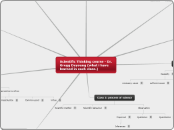av Mostafa louai 11 år siden
341
New Map
Understanding the scientific method is crucial for scientific thinking. It begins with asking a question, followed by conducting research to establish rules and formulating a hypothesis.

av Mostafa louai 11 år siden
341

Mer som dette
Science checklist: if claimed sciences' ideas match most of the checklist then it is considered a science.
Scientific checklist 1
Emperical
quantitative/precise
repeatable
testable
falsifiable
without bias
Scientific checklist 2
Focuses on natural world
Aims to explain natural world
Using testable ideas
relies on evidence
Involves the scientific community
leads to ongoing research
benefits from scientific behaviour
Develop one's moral character.
community good= personal good
Treat equals equally and unequals unequally
Respect the moral and human rights of everyone.
Greatest good for the greatest number of people.
Pseudoscience
Fixed ideas
no peer review
Selects only favorable discoveries
sees criticism as conspiracy
Non- repeatable results
Claims of widespread usefulness
Science
Willingness to change with new evidence
Ruthless peer review
Takes account of all new discoveries
Invites criticism
Verifiable results
Limited claims of usefulness
Accurate measurement
hold observations above theory
doesn't break rules of logic and theory
answers questions
gives out all data for others to repeat experiments
polite and helpful
could say what would falsify their theory
Adjust theory to fit facts
Use circular reasoning
Use arguments from ignorance
Use ad hominem attacks
Adjust data to theory
Won't debate
Quantitative observation: involves quantity or amount
ex. 125 g
Qualitative observation: describe's an object's characteristics
ex. red/tall
Emerical observations: made directly with human senses.
Inferences
Inferences are conclusions drawn from emperical the emperical observations.
Scientific behaviour
Observe
Study related things or phenomenons
Shrive for precise measurements
Design experiments
Test/modify/refine hypothesis
Formulate physical laws and theories
Establish laws and theories
Scientific method
Question
Research and define rules
Create a hypothesis
Experiment
Analyze outcome
Form conclusion
above
Correlation sometimes doesn't imply causation.
A causes b / Domini effect
Ex.Some rare diseases are caused due genetic factors so people with the disease must suffer consequences. ex death
Ex. match sticks are needed to cause fire.
oxygen is needed to cause fire
Dependent variable: observation we hope to create( prediction we made)
Independent variable: change is directly under the control of the experimentor.
Scientific idea + Expectations + Observation = scientific argument
Analysis
Inferences
Explanation
Evaluation
Interpretation
Self regulation
Slippery slope fallacy: one thing will lead to another
Ad hominem argument: distract from subject ex. direct attack on a person.
part to whole fallacy: If a is something then all a are the same. ex. terrorism
Post hoc ergo propter: this happened after this so this was the reason for this
Red herring: changing subjects
Hasty generalization: 2 is a number, 1 is a number so 2=1
non sequitur: doesn't follow at all
circular reasoning